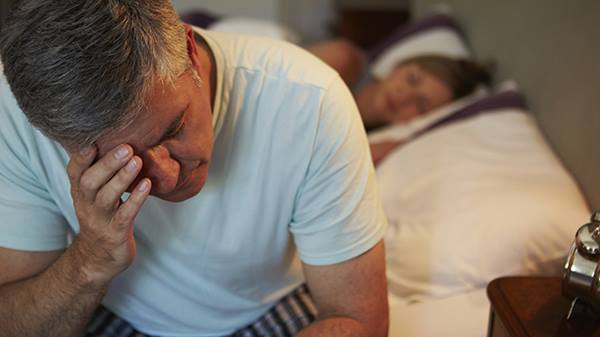I Wake Up at Night to Urinate—Is That Normal?
We’ve all been there before. You are comfortably in bed and then you get that pressure sensation in your bladder. You get up and use the bathroom, but very little comes out. Before you know it, you’ve woken up three more times just to urinate.
Sound familiar? You are not alone. According to a National Sleep Foundation survey, about 65 percent of people age of 55 and older reported getting up several times at night to use the bathroom.
To be perfectly candid, I wake up once a night to urinate. At the PUR Clinic, patients often ask me if their nightly urinary habits are “normal”. Well, that depends on several things. Drinking too much fluid before bedtime or untreated diabetes are two possible causes of nocturia, the medical term for waking up at night to urinate. If you’re concerned about your nightly urinary patterns, here is some information that can help you differentiate between what is normal and when you should seek medical attention.
Where does the urine come from?
Urine is made in your kidneys. From there it drops down the ureters (long tubes connecting the kidney to the bladder) and gets stored in the bladder. The bladder, which is like a balloon and is very elastic, stretches to store urine. When it is time to pass your urine, your bladder (which is made of muscle) starts to contract and helps to evacuate your bladder. From there, the urine in females exits through the urethra and in men will bypass the prostate before exiting through the urethra. The whole process is very well regulated from beginning to end.What is normal?
A 2010 study in the Journal of Urology examined the prevalence and incidence of nocturia. It found that up to one-third of men between the age of 20 to 40 had at least one instance of urination nightly. For women, the number was slightly higher—up to 43 percent. Fewer than one in five men and women in that age group reported two or more instances of nighttime urination.For people over the age of 70, it’s a different story. Over two-thirds of men and women over 70 urinate at least once per night, and up to 60 percent go twice or more each night.
In a nutshell, the study shows that it is very common for most people to wake up once a night, and it becomes more common as you get older.
Why do we urinate at night?
Nighttime urination does not adversely affect most people. However, if this disturbs your sleep patterns and productivity the next day, you should seek medical attention. Other medical conditions could cause this habit, and you should see a doctor to determine if there is another underlying reason for your nocturia, such as:Enlarged prostate: Men with an enlarged prostate may have difficulty completely emptying their bladder, which leads to urinary retention. At night, any small increase in urine in the bladder may lead to a heightened sensation to use the bathroom. Your primary care physician or urologist can assess you for these symptoms.
Overactive bladder: This may be secondary to nerve problems, medications, or lifestyle behaviors that make the muscles in your bladder work overdrive. Your primary care physician or urologist can help assess for these symptoms.
Excess fluid intake: If you are drinking fluids right before bed, especially caffeinated or alcoholic beverages, you may wake up to urinate because your kidneys will filter this fluid out while you sleep. Limit your intake during the three hours before bedtime and your symptoms may decline.
: This is a serious sleep disorder where breathing starts and stops. 50 percent of people with this condition may experience increased nighttime urination. This may be due to waking up from difficulty with breathing or an alternation in your hormones from the abnormal sleep patterns that increase your urine production. Sleep apnea is a serious condition that can be treated easily if it is diagnosed early. If you have symptoms, please see your doctor as soon as possible.
: Patients with congestive heart failure may notice increased fluid in their legs during the day due to the hearts poor ability to pump blood and gravity. At night, without the influence of gravity, the fluid is able to reenter the blood stream, causing an increase in urine production. Your doctor may change your medications to help drain that fluid out during the day to avoid the nocturia.
Uncontrolled Diabetes: Increased levels of sugar in the blood can cause an increase in urine production. Many new diagnoses of diabetes are actually found when patients come in with excess daytime or nighttime urinary frequency. Better sugar control may help this situation.
Medications: Some diuretics, or blood pressure medications, can decrease your pressure by removing excess fluid from your body. When you take these medications at night, they may cause increased urine output and nocturia. Ask your doctor to review your medications to determine whether you can take these medications during the day to avoid nighttime nocturia.
Neurologic problems:Damage to nerves that supply the bladder can lead to problems with bladder function, including frequent and sudden urges to urinate.
Stress: Stress has been linked to many medical problems including heart disease, obesity, depression and gastrointestinal problems. Stress may keep you awake and increase your levels of nocturia.
Many people wake up at night to urinate, but you can adjust your behaviors, medications, or overall health to improve your nightly symptoms. However, nighttime urination could be your body’s way of signaling another underlying issue, so don’t hesitate to talk to your doctor if you have concerns.For more information and health tips, follow Dr. Brambhatt on Twitter and Facebook.



